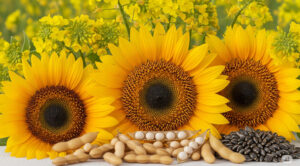
Foreign exchange earnings from rapeseed oil exports from Ukraine in the second half of 2025 increased 2.2 times compared to the same period of the previous season, while rapeseed meal revenues increased 1.4 times, according to Dmytro Kysilevsky, deputy chairman of the Verkhovna Rada Committee on Economic Development, citing data from the Ukroliyaprom association.
“The introduction of a 10% export duty on soybeans and rapeseed has allowed Ukraine to increase the production of oil and meal from these raw materials, as well as to increase exports of processed products,” he wrote on Facebook.
According to the association’s data, in July-December 2025, rapeseed processing into oil increased 1.8 times. In the soybean segment, in September-December 2025, oil production increased by 22.4%, exports by 23.3%, and foreign exchange earnings by 1.5 times.
“The processing of soybeans into oil and meal exceeded its exports by 3.7%,” the parliamentarian emphasized.
Ukroliyaprom predicts that in the 2025-2026 marketing year (MY, July-June), rapeseed processing will reach a record 1.7 million tons (over 50% of the gross harvest), and soybeans — 3.0 million tons (over 60%). This will ensure the production of 720,000 tons of rapeseed oil and 600,000 tons of soybean oil.
Kysilevsky emphasized that the processing model proved its effectiveness in the very first season of the duty law, providing billions of hryvnias in taxes. He also recalled the support programs “Made in Ukraine,” in particular, “5-7-9” loans and 25% compensation for the cost of agricultural machinery.
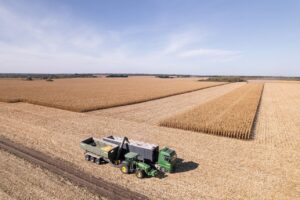
The crop division of the Alebor Group grain trading company has completed the 2025 production season, the company’s press service reported on Facebook.
According to the report, the company’s specialists grew and harvested wheat from 2,000 hectares with a yield of over 7 tons/hectare, corn from 1,100 hectares with a yield of 14.5 tons/hectare, rapeseed from 1,500 hectares with a yield of 3.6 tons per hectare, and sunflower from 1,800 hectares with a yield of 3.85 tons per hectare.
Alebor Group is a trading company founded in 2006 in the Cherkasy region. Its structure includes the Khristinivskoye Grain Receiving Enterprise (with a storage capacity of 74,000 tons of grain), the Voronovitske Grain Receiving Enterprise (104,000 tons of grain), Chesne Grain Receiving Enterprise (27,500 tons of grain), transport companies Boleko and Avtoera with a fleet of 210 heavy-duty grain trucks, and construction company Alebor Real Estate.
According to information on the company’s website, Alebor Group is one of the top 20 grain trading companies in Ukraine, exporting about 2 million tons of grain annually. The group has its own land bank of 6,500 hectares. The company’s founder is Oleksiy Kustov.
KMZ Industries is the largest manufacturer of elevator equipment in Ukraine and produces a full range of products, including silos, grain dryers, transport equipment, and separators, as well as providing automation and installation services.
According to the company, it has built more than 5,000 facilities. KMZ Industries silos with a total volume of more than 12.5 million cubic meters are in operation.
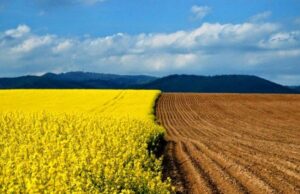
Ukraine maintains stable rapeseed export rates and, as of December 8, has shipped 52,000 tons, while in November the figure was almost 158,000 tons. In December, exports will remain within the range of 105,000-150,000 tons, according to the analytical cooperative “Pusk,” created within the framework of the All-Ukrainian Agrarian Council (VAR).
“Rapeseed exports remain stable. Paid duties have begun to return, and liquidity is gradually shifting toward exporters,” analysts said.
According to their data, rapeseed has been trading in a narrow range of EUR 477–480 per ton on the European market for about two months. There are price fluctuations of 2–3%, but there is no real dynamics. However, the crop may go up, analysts note, adding that soybeans are the key driver now: if they grow, rapeseed may also rise in price to EUR477–480 per ton.
According to their observations, the situation is similar on the domestic market: the conditional price remains at $550–560 per ton, and the indicative price of processing enterprises is 24–24.5 thousand UAH/ton.
“The market is generally stable. There are isolated cases of higher prices, but they are individual. Some factories are speeding up purchases due to a shortage of other crops, in particular sunflower, so a slight increase is possible,” the experts emphasized.
They reminded that forward trading in rapeseed from the 2026 harvest will soon intensify.
“The first indicative prices for new harvest rapeseed are announced at $430–435 per ton CPT port for small batch deliveries in July–August. The best period for forward fixing is traditionally January-March. There are no visible risks for the new harvest at the moment, but it is still too early to conclude contracts for large volumes,” Pusk recommended.
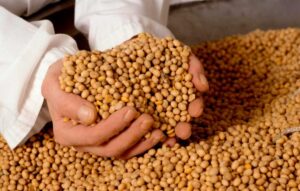
The Cabinet of Ministers has adopted a resolution introducing a mechanism for monitoring soybean and rapeseed exports, according to the press service of the Ministry of Economy, Environment, and Agriculture.
“We are introducing a transparent mechanism that allows producers, rather than intermediaries, to be exempt from export duties. The funds that the state will receive from traders’ duties will replenish a special budget fund and will be directed to programs to support frontline territories, where farmers work in the most difficult conditions, grants for processing, greenhouses, orchards, and insurance against military risks,” said Deputy Minister of Economy, Environment, and Agriculture Taras Vysotsky, whose words are quoted in a statement on the ministry’s website.
The Ministry of Economy noted that the document aims to ensure the fair application of export duty exemptions for certain categories of agricultural producers.
The new procedure establishes a monthly monitoring mechanism to be implemented by the Ministry of Economy to verify the compliance of exported product volumes with the data contained in the State Agrarian Register (SAR) regarding the actual products grown. If discrepancies are found between the declared and actual volumes grown, the Ukrainian Chamber of Commerce and Industry is obliged to cancel the expert conclusions.
“The introduction of such a mechanism ensures that only those exporters who have actually grown the products themselves will benefit from the exemption from export duties,” the ministry added.
The resolution ensures transparent and fair administration of the export duty exemption, prevents abuse during the export of soybeans and rapeseed, provides equal and fair conditions of competition for agricultural producers, and ensures state support for farmers, as only traders, not producers, will pay the duty, the statement said.
The government’s decision is expected to strengthen state control, ensure targeted budget revenues, and contribute to the stability of the agricultural sector. Monitoring will make it possible to simultaneously support conscientious producers and guarantee the replenishment of a special fund for the implementation of key agricultural development programs.
As reported, in September 2025, a law was passed introducing a 10% export duty on soybeans and rapeseed. Agricultural producers and cooperatives that export their own products are exempt from paying the duty. The duty is paid by traders and other exporters who are not producers. The mechanism is aimed at supporting farmers, stimulating domestic processing, and filling a special state budget fund to finance agricultural programs.

During the full-scale invasion, Ukraine commissioned 3 million tons of oilseed processing capacity, with the same amount planned and under construction, so there were underutilized enterprises in the country, said Minister of Economy, Environment, and Agriculture Oleksiy Sobolev in an interview with Forbes Ukraina.
“In September, rapeseed oil exports increased 4.5 times compared to August, turning raw material exports into processed products. The state receives a fiscal effect from duties on soybeans and rapeseed, the proceeds of which are directed to a special fund to support the agricultural sector, in particular the frontline territories, i.e., the main goal of the duty is being achieved,” he commented on the results of the introduction of a 10% export duty on soybeans and rapeseed.
The minister noted that to ensure the proper functioning of this mechanism, the government adopted an experimental resolution stipulating that producer-exporters do not pay duties like the rest. In particular, the resolution specifies the method by which a producer confirms that they have grown a particular crop and are entitled to exemption from duties.
In addition, Ukraine is introducing monitoring through the State Agrarian Register to form a unified system of soybean and rapeseed exporters.
Sobolev added that a mechanism for exchanging information between customs and tax authorities is currently being developed with a view to transitioning to an automatic mode in the future. This will be an IT solution, similar to the electronic VAT administration system (SEA VAT), which will be operational by September 2026.
“After the end of the marketing years, we will be able to evaluate the results. Preliminary data already indicate an increase in the share of domestic processing of rapeseed and soybeans,” the Minister of Economy concluded.
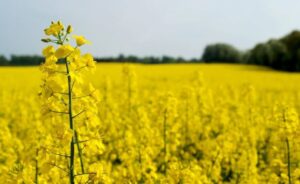
Rapeseed exports from Ukraine in October will not exceed 135-140 thousand tons, compared to 535 thousand tons last year (-73.8%). As of October 28, 125 thousand tons have already been exported, according to the analytical cooperative “Pusk,” created within the framework of the All-Ukrainian Agrarian Council (VAR).
“Exports are moving very slowly—everything is hampered by duties. It is they that have effectively stopped the normal work of exporters,” analysts noted.
At the same time, they noted that domestic processing volumes are growing.
“In September, we processed more than 100,000 tons of rapeseed, and in October, the figure will be no less. Against the backdrop of problems with sunflower, rapeseed is currently supporting the sector. Rapeseed prices in ports are quoted in the range of EUR 540-545/ton. At the same time, processors offer from UAH 25,000/ton and above,” analysts noted.
The European market is showing positive price dynamics.
“Over the past week, rapeseed exchange quotations have risen by EUR 10. January-February is traditionally expected to be the period of highest prices for this oilseed crop,” added Pusk.